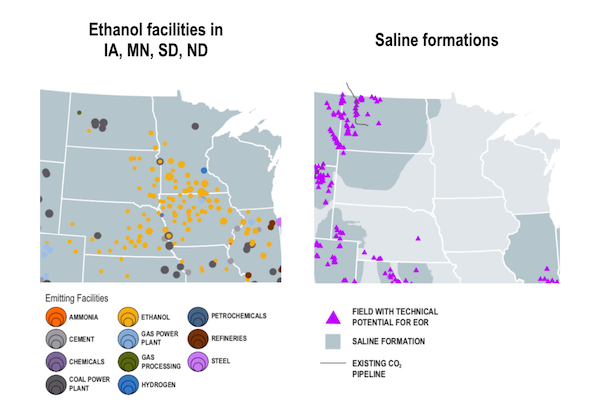Summit Agricultural Group has launched an interesting new business that is partnering with Midwest biorefiners to develop a novel carbon capture and storage project. The $2 billion plan includes a pipeline that would carry carbon captured at ethanol plants throughout the Midwest to a site in North Dakota. According to the company, it would be the largest such project in the world.
The new spinoff, Summit Carbon Solutions, wants to install equipment at biorefineries that will capture CO2 off the fermentation process. The CO2 would then be liquefied at the plants where feeder pipelines would carry it to a central pipeline extending across the Upper Midwest into central North Dakota. Summit Agricultural Group CEO Bruce Rastetter says the project would take 10 million tons of CO2 out of the atmosphere each year, which is equivalent to taking 2 million cars off the road annually.
Additionally, Rastetter said it will lower the biorefineries’ carbon footprints, allowing them to access and sell into more low carbon fuel markets, which he says are growing in number. That includes California, where a 2019 law allows ethanol facilities that use CCS to lower the carbon intensity of their fuel to generate tradable credits when they sell it in California. Producers of dirtier fuels that don’t meet California’s standards have to buy those credits to comply. Recently, the credits have been selling for around $200 per ton of carbon. Rastetter expects to see other similar markets to develop.
Renewable Fuels Association president Geoff Cooper calls the project a significant development for the ethanol industry. “And frankly,” Cooper says, “puts ethanol…on an even keel with the best electric vehicles that are out there in terms of their carbon footprint.”
Summit will need to secure the necessary state and federal permits for the underground pipeline but says it has already signed agreements with enough ethanol plants sequester 5 million tons of CO2 per year once the pieces are in place. The first phase includes 18 leading biorefiners across Iowa, Minnesota, South Dakota, and North Dakota, which Rastetter said will partner on the cost that is estimated at around $2 billion. The company’s goal is to sign on additional partners, including other types of carbon-emitting facilities like fertilizer producers and power plants.
The liquefied carbon will be stored in porous canyons at least a mile underground in central North Dakota. The state apparently sits atop the perfect geological conditions for CO2 storage, called deep saline formations. Rastatter says that geology is part of what attracted the company to the state. Another factor that makes the state attractive is its authority to regulate carbon injection wells. In 2018, it became the first state to assume that authority from the U.S. Environmental Protection Agency, which makes the permitting process much easier. Summit is also exploring other options, including injecting the gas into depleted oil fields to boost oil production, Rastetter said.
Summit said construction of the project could take at least 16 months and expects to be operational by 2024. Rastetter said a federal tax credit will also help fund the project. Learn more at the Summit Agricultural Group website HERE. (Source: Harvest Public Media, Grist, Associated Press)











